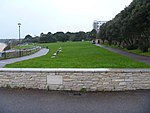Bournemouth ( BORN-məth) is a coastal resort town on the south coast in the Bournemouth, Christchurch and Poole unitary authority area in the ceremonial county of Dorset, England. The town's urban subdivision had a population of 187,503 at the 2011 census making it the largest town in the county; the town is part of the South East Dorset conurbation, which has a population of 465,000.
Founded in 1810 by Lewis Tregonwell, in an area of deserted heathland occasionally visited by fishermen and smugglers, as a health resort, Bournemouth became a town in 1870, with growth from the arrival of the railway. Bournemouth lies in the historic county of Hampshire. Following the local government reorganisation in 1974 the town was transferred to the county of Dorset, governed by Dorset County Council. Although the borough gained unitary authority in 1997, it retained Dorset's ceremonial county functions and emergency services. In April 2019, the borough was replaced by the current borough, also with unitary authority status, governing the town, Poole, Christchurch and surrounding areas.
Victorian architecture is notable in town centre. The 202-foot (62 m) spire of St Peter's Church, one of three Grade I listed churches in the borough, is a local landmark. The town's location has made it a popular destination for tourists, attracting over five million visitors annually with its beaches and popular nightlife. It is also a regional centre of business, home of the Bournemouth International Centre (BIC) and a financial sector that is worth more than £1 billion in gross value added.











